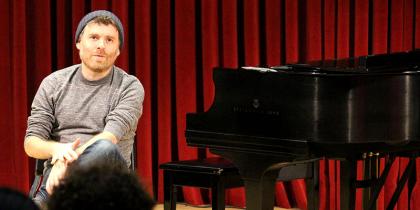You are here
Just a Dumb Phone and a Paper Map
Empathy and connection have been on singer-songwriter-composer Gabriel Kahane’s mind since November of 2016, when, in the raw aftermath of a divisive election, he boarded the first of many trains to begin a journey of 13 days and 9,000 miles. During that time, he spoke to strangers he met along the way and wrote songs from the stories that he heard. The result was an album, Book of Travelers, released in 2018.
In November 2019, Kahane appeared at Meany Center to perform songs from Book of Travelers, and accidentally left his laptop at home in Brooklyn.
Several days without his computer got him thinking about the intersection between technology and how we all see ourselves and each other. He contrasted his own narrow worldview — curated and amplified by social media — with the broad empathy he experienced engaging directly with people from vastly different backgrounds and perspectives during his train travels.
For his next project, he decided to spend a year away from the internet — no laptop, no smartphone, no social media, no apps — and see how his mind, heart and body might change away from technology. Meany Center offered to support Gabriel’s creative process by commissioning the new work through the University of Washington’s Mellon Creative Fellowship Initiative. Just a few weeks ago, Gabriel opened Meany Center’s 2021–22 Crossroads Series, presenting, in his words, a “work in progress.” (The official world premiere will be on our 2022-23 Season).
The day before his appearance on the Meany stage, he engaged in an informal discussion with students in the UW School of Music, facilitated by Dr. Leann Conley-Holcom, Director of Choral & Vocal Activities at Seattle University. He started the conversation by exploring the intersection of capitalism and technology in human interactions, and how social media can obscure commonalities while promoting differences between people.
“Technology is not based on love,” Kahane says. “There is an algorithm — a thumb on the scale that prevents nuanced arguments as the dominant narrative. Conflict equals clicks.”
“I didn’t realize what an addict I’d been,” he said. “It was easier to quit it all cold turkey than to find moderation — delete all your current apps and you’ll still find something else to look at as long as you have that smartphone in your pocket.”
Gabriel’s year offline coincided with the worst of the pandemic. “In March 2020, I flew from Brooklyn to Portland for a week,” he says, “and never went back.” Now he, his wife and child are living there (where he currently serves as the Portland Symphony’s Creative Chair, writing and performing three new works, and serving as an advisor for contemporary programming on the Classical Series).
For a good part of that year, he was trying to write what he wryly described as “Epic Songs About America in Times of Tribulation.” When that proved too overwhelming, he gave himself permission to write about “smaller things,” from making coffee, to cats, to the dismantling of the social safety net.
During the month of October, he wrote a song a day — a new kind of writing and recording for him. “It didn’t necessarily play to my strengths as a musician,” he says, “but I’m excited about the process.”
His internet moratorium officially came to an end in November 2021, but he’s still digesting what he’s learned from this experience. “I had the privilege as an artist to do this project,” he says, “to be able to reflect on new technologies and how we adopt them without really considering if they are salutary.”
One change that’s stuck with him, however, is that he no longer carries a smartphone. “Life is so much better with a dumb phone and a paper map!”


